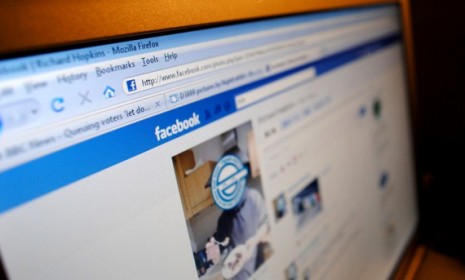6 new scientific findings about Facebook users
Why Friday mornings are the best time for posting updates, and five other recent conclusions from the emerging field of "Facebook studies"

A free daily email with the biggest news stories of the day – and the best features from TheWeek.com
You are now subscribed
Your newsletter sign-up was successful
With Facebook now claiming 500 million members, it's no surprise that the world's largest social-networking site has become a hot new field for research in the social sciences, says Helen A.S. Popkin at MSNBC. What have we learned? Here's a look at six notable findings:
1. Heavy user? You might be narcissistic
A study from York University in Canada found that the people who frequently update their Facebook pages most frequently tend to be narcissistic — or struggling with low self-esteem. The "more posts = more narcissism" conclusion reinforces a 2008 study from the University of Georgia. Both studies found that narcissists use Facebook for self-promotion; the York one notes that conceited females focus on glamorous, posed photos while males tend to brag in the "About Me" section. Just what we need, says MSNBC's Popkin: Another study showing "Facebook users are jerks."
The Week
Escape your echo chamber. Get the facts behind the news, plus analysis from multiple perspectives.

Sign up for The Week's Free Newsletters
From our morning news briefing to a weekly Good News Newsletter, get the best of The Week delivered directly to your inbox.
From our morning news briefing to a weekly Good News Newsletter, get the best of The Week delivered directly to your inbox.
2. If you want to make a splash, post photos on Friday morning
Among the hordes of "friends" everyone has on Facebook, getting noticed can be hit-or-miss. For more hit and less miss, says social media marketing firm Virtrue, post a photo (not video) before noon on Friday. The specifics: Photos get clicked on 22 percent more than video posts, and 54 more than text-only posts; anything posted before noon gets 65 percent more clicks than afternoon updates; and Fridays are the best, and weekends the worst, for getting attention. However, "if you don’t like this data," notes Peter Kafka at All Things D, "you can always find another set of numbers that may suit you a bit better."
3. Facebookers love to project
Cornell researchers found that users have a tendency to assume that all their online acquiantances share their views. In the study, Facebookers gave their views on a series of hot-button political issues, then guessed what their friends think; their friends did the same. "Result?" says David Berreby at Big Think. "People way overestimate the extent to which their friends agree with them."
A free daily email with the biggest news stories of the day – and the best features from TheWeek.com
4. Lots of logging in = Lower grades
Dutch psychologist Paul Kirschner discovered that college students who check Facebook while studying do substantially worse in school. Looking at 219 U.S. college students, Kirschner found that the Facebook checkers had an average GPA of 3.06, while non-checkers had a 3.82 GPA. Older studies reported strikingly similar drops. It's hardly a shock, says Nikki Gloudeman in Mother Jones. "Stalking ex-boyfriends online totally cuts into study time."
5. Status updates are more urgent than going to the bathroom
A study from Oxygen Media and Lightspeed Research looked at the social media habits of women age 18 to 34, and the results were a little disturbing: 34 percent said they check Facebook first thing upon waking up, before coffee, before going to the bathroom; 39 percent self-identify as full-on Facebook "addicts"; 49 percent think it's fine to hack a boyfriend's account to check on him; and 89 percent say you shouldn't post anything you wouldn't want your parents to see. Um, doesn't that last one seem kind of "contradictory to the 42 percent that think it’s fine to post pictures of themselves drunk?" says Ben Parr at Mashable.
6. In spite of it all, Facebook may be making you happier
The British Computer Society apparently shattered one myth — that too much time spent social networking makes people feel isolated and out of touch with the real world. Instead, BCS found, using Facebook has a "statistically significant, positive impact on life satisfaction." The jump in happiness was greatest among low-income people, women, and less-educated users. So much for the online "'loner' stereotype," says researcher Paul Flatters.